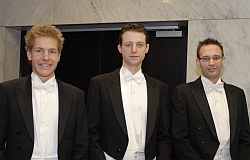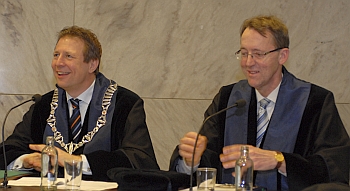How to organise and manage new product developments
 On February 12, <link people ferdinand-jaspers _blank>Ferdinand Jaspers has defended his PhD thesis entitled “<link erim events _blank>Organizing Systemic Innovation”. Jaspers’ thesis provides insights that will help managers to organise and manage new product development (NPD) projects. These projects indeed often fail to meet quality, budget, and time objectives. This especially holds true for systemic innovation projects, i.e. projects that involve the change of numerous highly interrelated components.
On February 12, <link people ferdinand-jaspers _blank>Ferdinand Jaspers has defended his PhD thesis entitled “<link erim events _blank>Organizing Systemic Innovation”. Jaspers’ thesis provides insights that will help managers to organise and manage new product development (NPD) projects. These projects indeed often fail to meet quality, budget, and time objectives. This especially holds true for systemic innovation projects, i.e. projects that involve the change of numerous highly interrelated components.
Jaspers argues that two issues are of particular managerial concern. First of all, the involvement of firms in NPD projects: should firms be involved in NPD projects in the first place, and if so, to what extent and in what type of projects? To address this issue, this thesis presents a model that proposes, for different types of NPD projects, one or more organisational forms that contribute to project performance.
Secondly, once a firm has decided to perform a development project, the question arises how to organise and manage these projects. What type of manager should be in charge of the project? To what extent should team members have freedom to make decisions? To what extent should a team be open for the input from suppliers and customers? More in particular, this thesis shows how factors such as these influence the ability of project teams to solve technical problems, which - as shown - is critical for the performance of (systemic) development projects. Jaspers for instance finds that it is very important that team members communicate freely among each other, but he also finds that the type of problem at hand is of importance here.
 His promoter is <link people jan-van-den-ende _blank>Prof.dr.ir. J.C.M. van den Ende, Professor of Management & Technology, Rotterdam School of Management, Erasmus University Rotterdam. Other members of the Doctoral Committee are Prof.dr. G.M. Duysters, Prof.dr. W. Hulsink and Prof.dr. S.L. van de Velde.
His promoter is <link people jan-van-den-ende _blank>Prof.dr.ir. J.C.M. van den Ende, Professor of Management & Technology, Rotterdam School of Management, Erasmus University Rotterdam. Other members of the Doctoral Committee are Prof.dr. G.M. Duysters, Prof.dr. W. Hulsink and Prof.dr. S.L. van de Velde.
About Ferdinand Jaspers:
Ferdinand Jaspers was born in 1978 in Breda, the Netherlands. In 1997 he finished his pre-university education in Oosterhout (Sint-Oelbert Gymnasium). In 2002 he completed his study Business Administration (Strategic Management) at RSM. After his graduation, Ferdinand joined this same school as a scientific researcher in the department Management of Technology and Innovation. In 2004, with the support of the Erasmus Research Institute of Management, he became a Ph.D. candidate within this department. His research focuses on the management and the organization of innovation. During his time as a PhD candidate, he taught twice the master elective Innovation in High Tech Industries.
Jaspers presented his work at numerous academic conferences, such as the Academy of Management Meeting (2006, 2007, 2008), the 2008 EGOS colloquium, the International Product Development Management Conference (2004 and 2005), the R&D Management Conference (2005) and the Annual IMP Conference (2005). His work has appeared in or is forthcoming in Technovation, Industrial Marketing Management, Technology Analysis & Strategic Management, the Journal of Purchasing and Supply Management, and the International Journal of Technology Management. Ferdinand currently works as an assistant professor at RSM’s Centre for Entrepreneurship.
Thesis Abstract:
Systemic innovation refers to product development activities that involve the change of multiple interdependent components. Unlike autonomous innovation, which refers to components that change independently, systemic innovation is for many firms the norm rather than the exception. This is for instance the result of increased efforts to develop products from multiple (new) technologies, such as mobile phones. The systemic nature of innovation, combined with its inherent uncertainty, makes it a challenging task to organise and manage this process as well as possible. This is why this thesis develops and tests several theories to explain the performance of new product development (NPD) projects. Of main concern are the performance implications of a project’s organisational form. This thesis, for instance, proposes and refines a configurational theory about the integration of component development projects by systems integrators. These firms are responsible for the coherent design and development of (complex) product systems, i.e. systems integration. The theory predicts that systems integrators carefully combine project ownership, supplier involvement, knowledge management, and coordination intensity to improve their products. This thesis also tests to what extent the organisation of NPD projects contributes to the capability of NPD teams to solve technical problems. The results indicate that systemic problems require differently organized teams than autonomous problems. For instance, systemic problems are solved relatively fast in the presence of a powerful project manager. In addition, Jaspers has found that search for external information helps to generate high-quality solutions for systemic problems, but only to a certain degree. After that, this effect turns negative.
More Information
Pictures of the Defense
Full Text of the Dissertation


